IELTS Preparation in Coimbatore for best Training and super intensive Coaching and Tutoring for Reading, Writing, Listening and Speaking in the IELTS Exams.
IELTS Preparation in Coimbatore
Lingua World offers the best IELTS Training in Coimbatore. The weekly and weekday IELTS Coaching sessions are tailored to the needs of professionals and executives visiting English speaking countries for business or higher education.
Reading:
Reading is one of the hardest areas in IELTS Preparation. As performance in Reading Paper decides the overall performance of the candidate special care has to be taken and more focus must be attached to this training part. We have framed the IELTS Reading module in such a way as to enable the candidates to perform very well in the Reading paper.
Writing :
Writing is a well-refined art requiring a great deal of preparation. As the Task 1 in the Academic Stream requires the skill of interpreting the graphs and charts we are making available to the candidates hundreds of worked-out samples and modals making the task of interpreting the data a breeze.
Listening:
For improving the pronunciation of the participants special audio-video sessions are conducted on a regular basis which help improve the accent and pronunciation of the candidates. In the process the overall communication skills of the IELTS candidates are enhanced.

Speaking:
As the speaking part of the IELTS test assesses the speaking skills of the candidate special care is taken to ensure that the candidate is able to do all the three parts of the speaking test effectively and quite successfully. Test for fine tuning the skills of communication is conducted on a regular basis.
As a result our candidates are heads and shoulders above others in all the four areas.
 Plus Points of the IELTS Training:
Plus Points of the IELTS Training:
- Individualized and personalized training
- Continuous and Comprehensive Evaluation
- A structured method of teaching
- A track record of success in IELTS Training
- Developing Communication Skills
- Structured Materials
- Integration of modern technology
IELTS FORMAT
IELTS is available in two test formats: Academic or General Training. There are four parts – Listening, Reading, Writing and Speaking. The total test time is 2 hours and 45 minutes.
All test takers take the same Listening and Speaking tests but different Reading and Writing tests. The distinction between IELTS Academic and IELTS General Training lies in the subject matter of the Reading and Writing components.

Listening, Reading and Writing must be completed on the same day, with no breaks in between them. The order in which these tests are taken may vary.
The Speaking test will either be after a break on the same day as the other three tests, or up to a week before or after the other tests. This will depend on your test centre.
Listening
30 minutes
You will listen to four recorded texts, monologues and conversations by a range of native speakers, and write your answers to a series of questions.
These include questions that test your ability to understand main ideas and detailed factual information, ability to understand the opinions and attitudes of speakers, ability to understand the purpose of an utterance and the ability to follow the development of ideas.
A variety of voices and native-speaker accents are used and each section is heard only once.
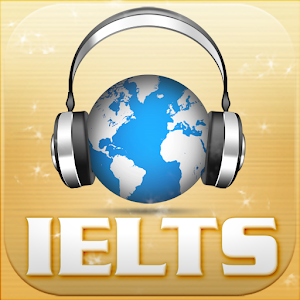 Section 1
Section 1
A conversation between two people set in an everyday social context.
Section 2
A monologue set in an everyday social context, e.g. a speech about local facilities.
Section 3
A conversation between up to four people set in an educational or training context, e.g. a university tutor and a student discussing an assignment.
Section 4
A monologue on an academic subject, e.g. a university lecture.

Academic Reading
60 minutes
The Reading component consists of 40 questions. A variety of question types is used in order to test a wide range of reading skills. These include reading for gist, reading for main ideas, reading for detail, skimming, understanding logical argument and recognising writers’ opinions, attitudes and purpose.
The Academic version includes three long texts which range from the descriptive and factual to the discursive and analytical. The texts are authentic and are taken from books, journals, magazines and newspapers. These have been selected for a non-specialist audience but are appropriate for people entering university courses or seeking professional registration.
General Training Reading
60 minutes
The Reading component consists of 40 questions. A variety of question types is used in order to test a wide range of reading skills. These include reading for gist, reading for main ideas, reading for detail, skimming, understanding logical argument and recognising writers’ opinions, attitudes and purpose.
The General Training version requires test takers to read extracts from books, magazines, newspapers, notices, advertisements, company handbooks and guidelines. These are materials you are likely to encounter on a daily basis in an English-speaking environment.
Academic Writing
60 minutes
The Writing component of IELTS Academic includes two tasks. Topics are of general interest to, and suitable for test takers entering undergraduate and postgraduate studies or seeking professional registration.
Task 1
You will be presented with a graph, table, chart or diagram and asked to describe, summarise or explain the information in your own words. You may be asked to describe and explain data, describe the stages of a process, how something works or describe an object or event.
Task 2
You will be asked to write an essay in response to a point of view, argument or problem. Responses to both tasks must be in a formal style.
General Training Writing
60 minutes
The Writing component of IELTS General Training includes two tasks which are based on topics of general interest.
Task 1
You will be presented with a situation and asked to write a letter requesting information, or explaining the situation. The letter may be personal, semi-formal or formal in style.
Task 2
You will be asked to write an essay in response to a point of view, argument or problem. The essay can be slightly more personal in style than the Academic Writing Task 2 essay.
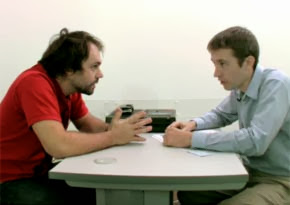
Speaking
11–
14 minutes
The Speaking component assesses your use of spoken English, and takes between 11 and 14 minutes to complete. Every test is recorded. The Speaking component is delivered in such a way that it does not allow people to rehearse set responses beforehand.
Part 1
The examiner will ask you general questions about yourself and a range of familiar topics, such as home, family, work, studies and interests. This part lasts between 4 and 5 minutes.
Part 2
You will be given a card which asks you to talk about a particular topic. You will have 1 minute to prepare before speaking for up to 2 minutes. The examiner will then ask one or two questions on the same topic to finish this part of the test.
Part 3
You will be asked further questions connected to the topic in Part 2. These questions will give you the opportunity to discuss more abstract ideas and issues. This part of the test lasts between 4 and 5 minutes
]]>
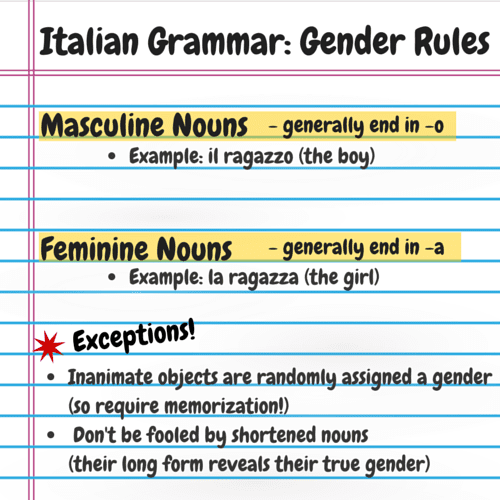

 How to conjugate a regular -er verb
More than 80 percent of French verbs are -er verbs. It’s great for you, because after you know their pattern of conjugation in the present tense, you can pretty much conjugate 80 percent of French verbs. Doesn’t that sound great?
To conjugate a regular -er verb, drop the -er of the infinitive to get the stem. Then add the six present tense endings specific to -erverbs:
How to conjugate a regular -er verb
More than 80 percent of French verbs are -er verbs. It’s great for you, because after you know their pattern of conjugation in the present tense, you can pretty much conjugate 80 percent of French verbs. Doesn’t that sound great?
To conjugate a regular -er verb, drop the -er of the infinitive to get the stem. Then add the six present tense endings specific to -erverbs:
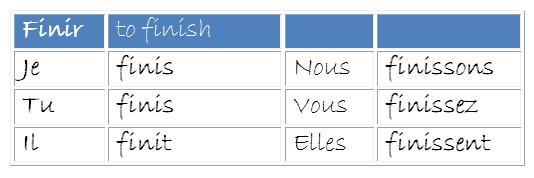
 How to conjugate a regular -re verb
Verbs that end in -re are the third conjugation type. To form the present tense of an -re verb, drop the -re of the infinitive, like you do for -er and -ir verbs. When you do that, you’re left with the stem for the conjugation of the present tense, and you can add the present tense endings specific to -re verbs:
How to conjugate a regular -re verb
Verbs that end in -re are the third conjugation type. To form the present tense of an -re verb, drop the -re of the infinitive, like you do for -er and -ir verbs. When you do that, you’re left with the stem for the conjugation of the present tense, and you can add the present tense endings specific to -re verbs: 
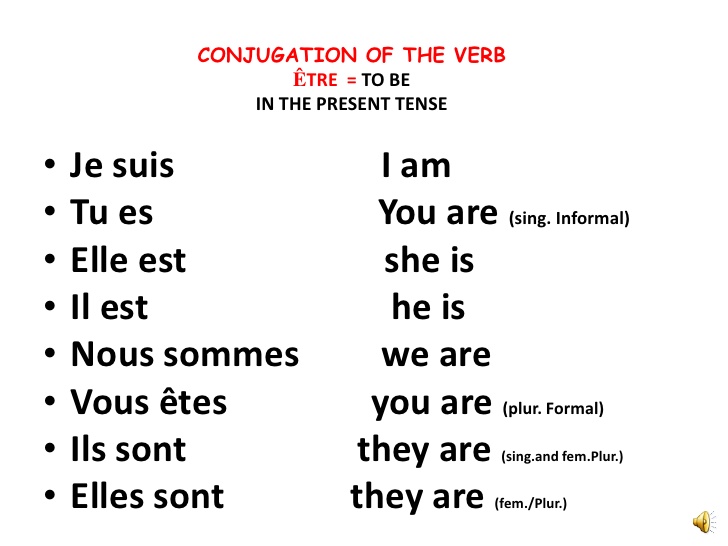
 For pronounciation, be very careful with ils sont (they are) and ils ont (they have), because they have pretty similar sounds. The difference is between the soft sound of ils sont and the z sound created by the liaison (the verbal link between the final -s and the following vowel) in ils ont.
For pronounciation, be very careful with ils sont (they are) and ils ont (they have), because they have pretty similar sounds. The difference is between the soft sound of ils sont and the z sound created by the liaison (the verbal link between the final -s and the following vowel) in ils ont.

 ]]>
]]>
 The expression il y a is reduced to y a in everyday speech. When il y a is followed by a number, it means ago. Il y a cinq minutes means five minutes ago. Some common slang words for money include: le fric, le pèze, le pognon, des sous and for job/work: le boulot.
To express in a certain month, such as in May, use en before the month as in “en mai.” With dates, the ordinal numbers are not used, except for the first of the month: le premier mai but le deux juin. Also note that months are all masculine and not capitalized in French (same as days of the week).]]>
The expression il y a is reduced to y a in everyday speech. When il y a is followed by a number, it means ago. Il y a cinq minutes means five minutes ago. Some common slang words for money include: le fric, le pèze, le pognon, des sous and for job/work: le boulot.
To express in a certain month, such as in May, use en before the month as in “en mai.” With dates, the ordinal numbers are not used, except for the first of the month: le premier mai but le deux juin. Also note that months are all masculine and not capitalized in French (same as days of the week).]]>
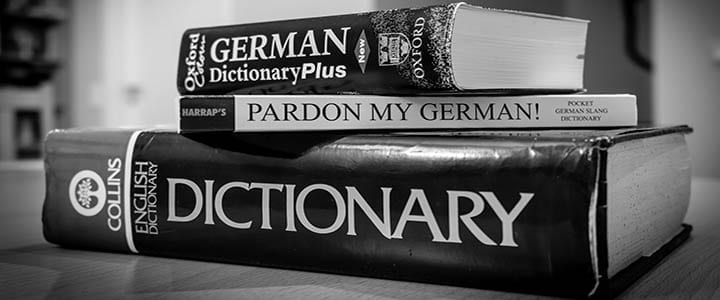
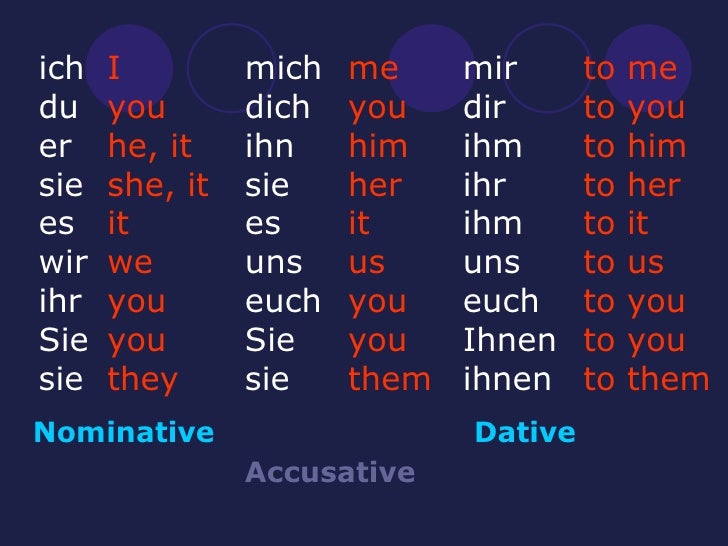 Konjugation Präsens I
Konjugation Präsens I
 Konjugation Präsens II (sein)
Konjugation Präsens II (sein)
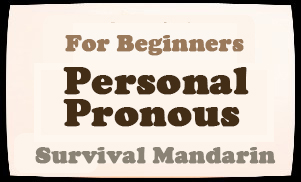 CHINESE PRONOUNS
There are just three basic pronouns in spoken Mandarin:
I, me –
CHINESE PRONOUNS
There are just three basic pronouns in spoken Mandarin:
I, me –

 Plus Points of the IELTS Training:
Plus Points of the IELTS Training:
 Listening, Reading and Writing must be completed on the same day, with no breaks in between them. The order in which these tests are taken may vary.
The Speaking test will either be after a break on the same day as the other three tests, or up to a week before or after the other tests. This will depend on your test centre.
Listening, Reading and Writing must be completed on the same day, with no breaks in between them. The order in which these tests are taken may vary.
The Speaking test will either be after a break on the same day as the other three tests, or up to a week before or after the other tests. This will depend on your test centre.

